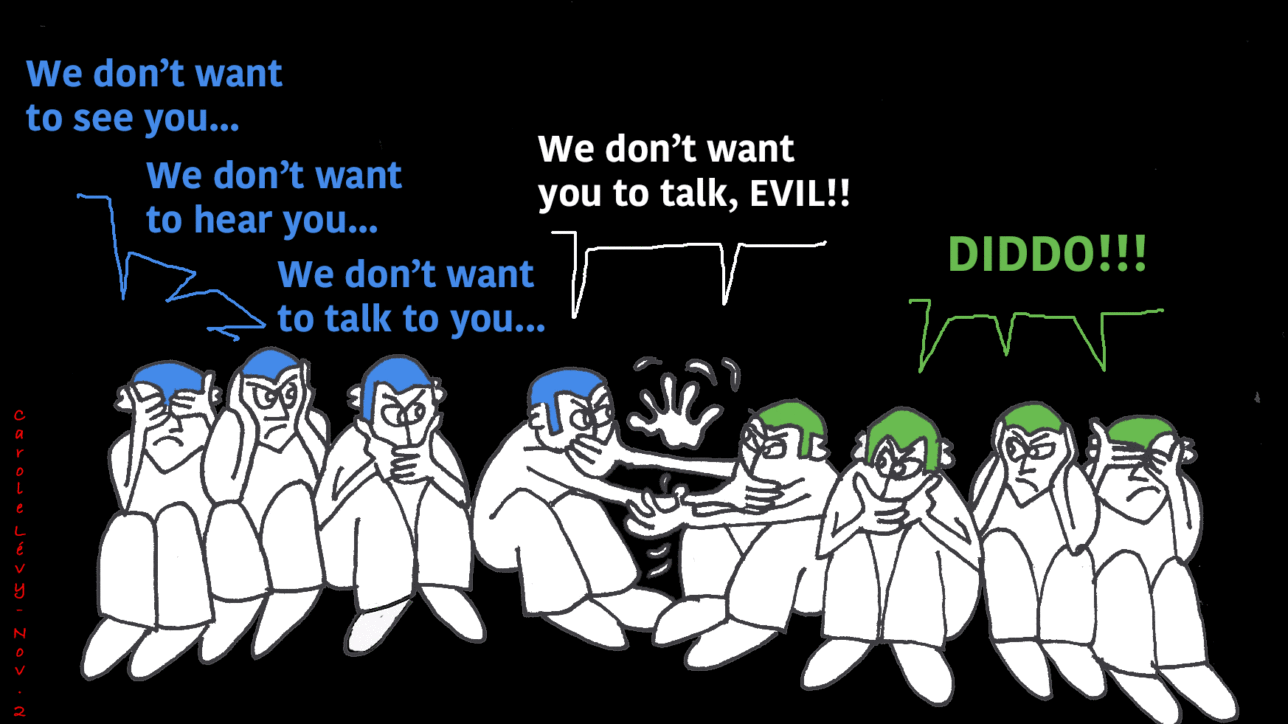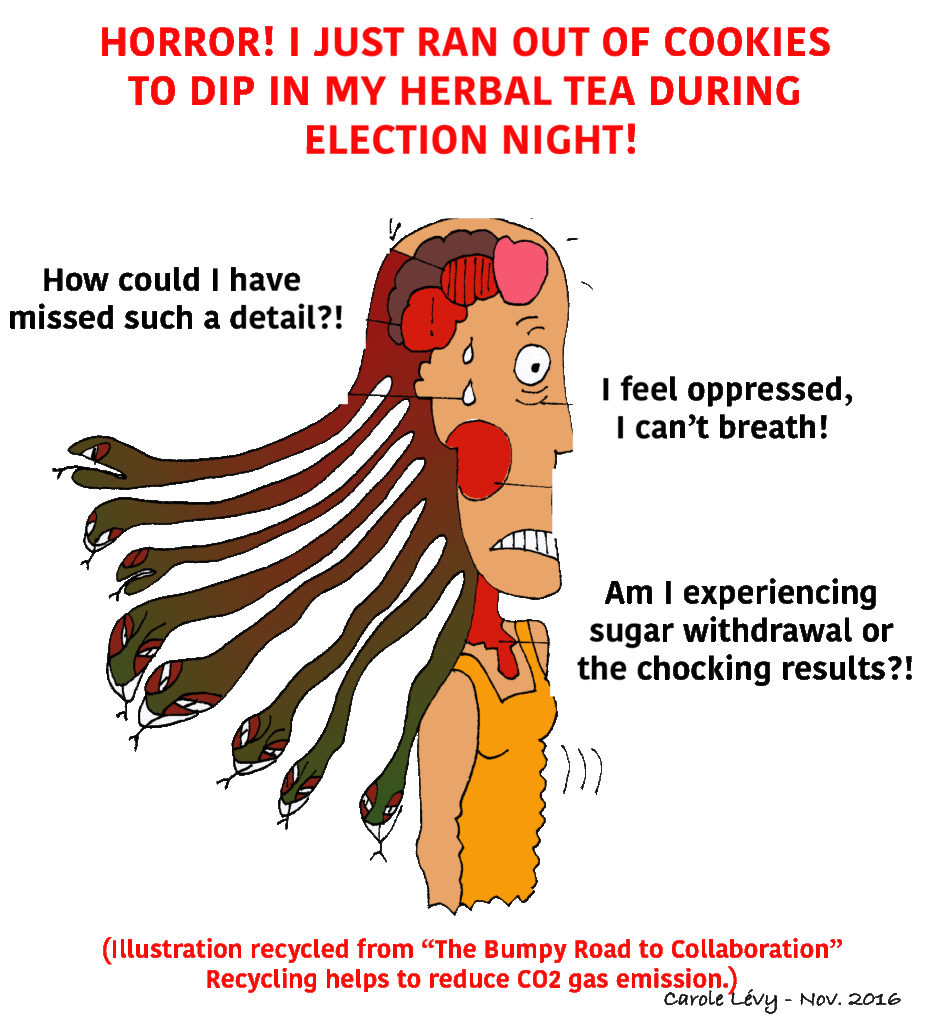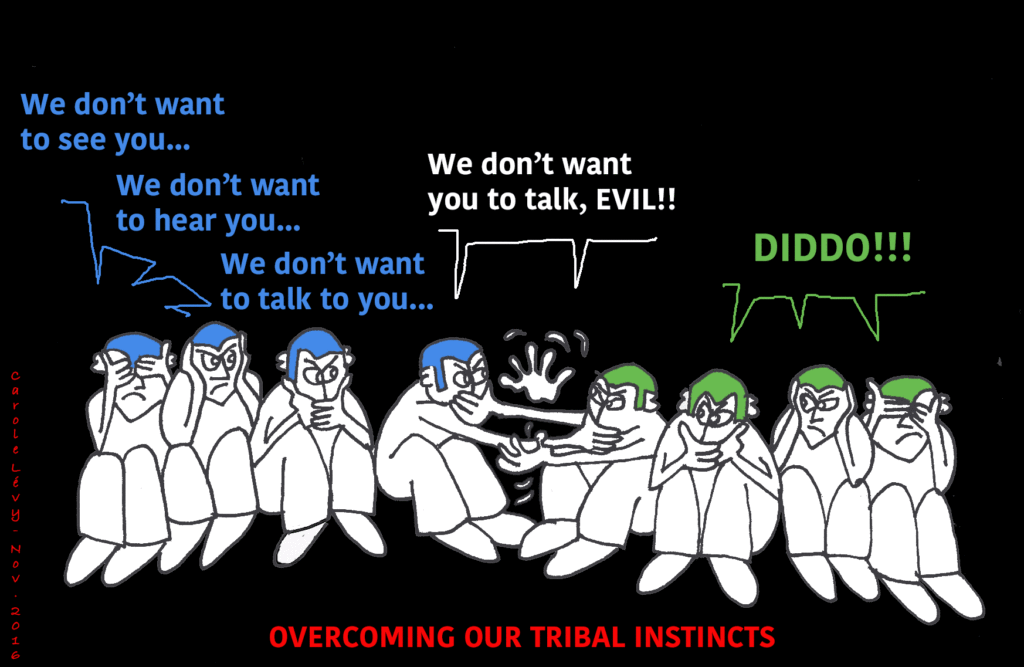In a VUCA world (Volatile, Uncertain, Complex and Ambiguous), unexpected events happen more often, more suddenly and more intensely. We inherited propensities from our ancestors who survived to pass on their genes to future generations, but not necessarily an agility to adapt to fast change in maintaining the homeostasis of the brain – the green zone.
I want to confess, hopefully without hurting the sensibilities of anyone, that on the night of November 8th, 2016, for me the unexpected happened.
To my credit, I didn’t stay too long in shock. Perhaps because over the last three years, I’ve been personally training myself to cool down my hot buttons, with a recent special focus on my anger diet, smiling at my fears, stepping out of my comfort zone, and finding the crack in my cemented opinions.
Relentlessly working on my emotional reactions and –let’s admit it- righteousness toward my husband, friends and colleagues, perhaps I have prepared myself for a much larger and important cause: addressing our national divide – the impasse of communication between two polarized parties, leading to disgust for the opinions of the “other camp.”
If politics was a way – through dialogue, debates and compromises- to express our competitive and combative tribal nature without hurting anyone, in the last twenty years, it has more and more become a “violent means” to justify “righteous ends.” Today, the other side is not just our opponent, it is pure evil. And nobody wants to compromise with evil.
I’m referring to the work of Jonathan Haidt, social psychologist and author of The Righteous Mind: Why Good People are Divided by Politics and Religion. It was published in 2012, but I found his work incredibly relevant to today’s situation. In exploring his provocative material, I’ve been inspired. Here are a few take-away:
- Intuition comes first and strategic reasoning second. Our beliefs are reinforced by our brain confirmation bias, and are amplified by our access to the internet and its mass-information, true or false.
- What binds us together (our religious and political beliefs and their moral components) tends to blind us. We live in our own “moral matrix”, convinced that we are in the right reality while the other camp is in La-La Land. The phenomenon has been intensified in the last 20 years by several factors that include:
- the purification of parties (no more liberal Republicans or conservative Democrats)
- the replacement of the Greatest Generation (more prone after World War II to join collaborative efforts and compromise) by the Baby Boomers (more prone to “black and white”/dialectical thinking and cultural wars).
- the loss of social and “moral” diversity in local communities (people live in concentrated like-minded communities – and therefore are rarely exposed to the ideas of the other side. (By the way, Haidt breaks down the concept of morality into six moral concerns. Of course, the concerns of conservatives and liberals are very different, but they could be complementary).
Communication is often all we have to make change happen. As anthropologist Angeles Arrien used to say, it is magical – an Open Sesame that can open, or close doors.
So maybe, if we want things to change, we have to reflect on how we can communicate better.
Too often, in debating with others, we silence our opinions, thinking “why bother”, or we produce a “monologue disguised as dialogue” (Martin Buber), and we lecture others. Frankly, unless you are a preacher, even the people who have the same opinions as you, hate to be lectured.
I don’t want to demonize anyone, but I also don’t want to ignore the darkness, confusion and propaganda that takes over our lives. I don’t want to dump my opinions on others, but I don’t want to shut down either. Right now, I’m uncomfortably in-between.
Perhaps for Thanksgiving, besides love, empathy, gratitude and bickering, we could remain in-between, trying to find our way into a centered communication, adding to each other’s voice, without resolving anything necessarily, but without hurting anyone either. And perhaps that would be a good enough beginning to undertake a familial, even national, reconciliation.
Reflections: How is your communication when you are in debate? How do you manage a different point of view? Do you remember delicate but generative conversations that helped you to grow as a human being?











Merci for this Carole. It is right to the point! Appreciate always your perspective AND your delightful artistry. xoxox
Merci Arina!